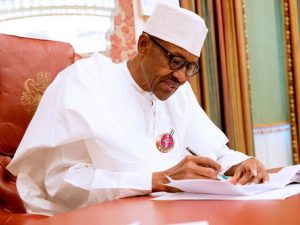
Lagos, Nigeria, May 22, 2018//– Despite strong oil output, Nigeria suffered its first economic decline since the end of recession when the gross domestic product (GDP) growth declined by 1.95 percent in first quarter of 2018 compared to 2.11 percent in the preceding quarter.
The National Bureau of Statistics (NBS) on Monday said the dip was a slight drop from 2.11 percent year-on-year in the final quarter of 2017.
The economy shrank 0.91 percent in the first quarter of 2017.
The GDP data comes a day before the central bank announces its decision on interest rates, with recent economic data showing that there’s scope for a rate cut as inflation dropped to a more than two-year low in April of 12.48 percent.
The NBS said that “still on the first quarter of 2018, aggregate GDP stood at N28.464 trillion in nominal terms. This performance is higher when compared to the first quarter of 2017, which recorded a nominal GDP aggregate of N26.028 trillion, thus presenting a positive year-on-year nominal growth rate of 9.36 percent”.
The main difference between nominal and real values is that real values are adjusted for inflation, while nominal values are not. As a result, nominal GDP will often appear higher than real GDP. Values for real GDP are adjusted for differences in prices levels, while figures for nominal GDP are not.
Growth rates had been bouncing back since the third quarter of 2016, when the recession, its first in 25 years, bottomed out. Nigeria exited that contraction last year largely due to higher oil prices, with the country relying on crude sales for around two-thirds of government revenue.
“Quarter on quarter, real GDP growth was -13.40 percent,” the bureau said, adding that the oil production estimates for the third and fourth quarters of 2017 had been revised and oil GDP for those quarters had been adjusted accordingly.
The oil sector grew 14.77 percent in the period, higher than the non-oil sector which rose 0.76 percent between January and March, the NBS said. Oil production stood at 2 million barrels per day in the quarter, up from 1.95 million in the previous quarter.
“This rate of growth is, however, lower relative to growth recorded in Q1 2017 by -7.70 percent points at 17.06 percent but higher than the preceding quarter by 2.14 percent points at 7.22 percent.”
NBS stated that agriculture sector grew 3.0 percent (4.23% Q4 2017, 3.39% Q1 2017); industry by 6.86 percent (4.87% Q4 2017, -5.83% Q1 2017); while services declined by 0.47 percent (0.10% Q4 2017, -0.37 percent Q1 2017).
Reacting to the new figure, Cyril Ampka, an Abuja based economist, said the slow down indicated that there is danger lurking around the economy.
“My take is simple. Merely looking at the figure indicates that danger is looming. I will implore the government to look into the reason for the slow down closely and attempt to redress it because this is dangerous as Nigeria approaches the election year in 2019. Naturally, things will slow down in anticipation of the general election”, Ampka said.
Senior Lecturer at Pan Atlantic University, Dr. Bongo Adi, said the “misalignment between monetary and fiscal policy” is a major factor responsible for the slowdown in growth.
“Even though they say they are pushing for fiscal expansion, interest rate is still at 14 percent and it has been like that for close two years now. It is just like the conditions under the recession have not changed.
“We are operating like we are still operating under a recession environment. I don’t understand the justification for keeping rates high! It is this hold down on policy rates that is causing this lack of acceleration in growth.”
Rasheed Alao, Head of Department of Economics at Adeyemi College of Education, Ondo, said the slowdown calls for the overhaul of economic activities in the country as regard the Economic Recovery and Growth Plan (ERGP) of the current administration.
“Looking at the development critically, it means some aspects of the ERGP are not working as stipulated. In my own opinion, the economy is still not encouraging enough to attract foreign investors and without foreign investors, our economy cannot grow”.
Fitch Ratings said Nigeria’s gross domestic product (GDP) growth is expected to accelerate to 2.4 percent this year, as the country continues to climb out of the oil price shock recession that characterised 2016 and first quarter of 2017.
The foremost rating agency noted that the growth turned positive in the second quarter of last year, and the recovery of oil production to 2.1 million barrels per day by the fourth quarter boosted oil sector output, adding that greater foreign exchange availability provided a lift to the non-oil export sectors, particularly agriculture.
“Fitch expects that these trends will continue, but notes that tight monetary conditions will continue to weigh on Nigeria’s growth outlook. Fitch forecasts 2019 growth to rise slightly to three percent, compared with 4.8 percent for the five years prior to 2016,” it said.
Independent.ng


